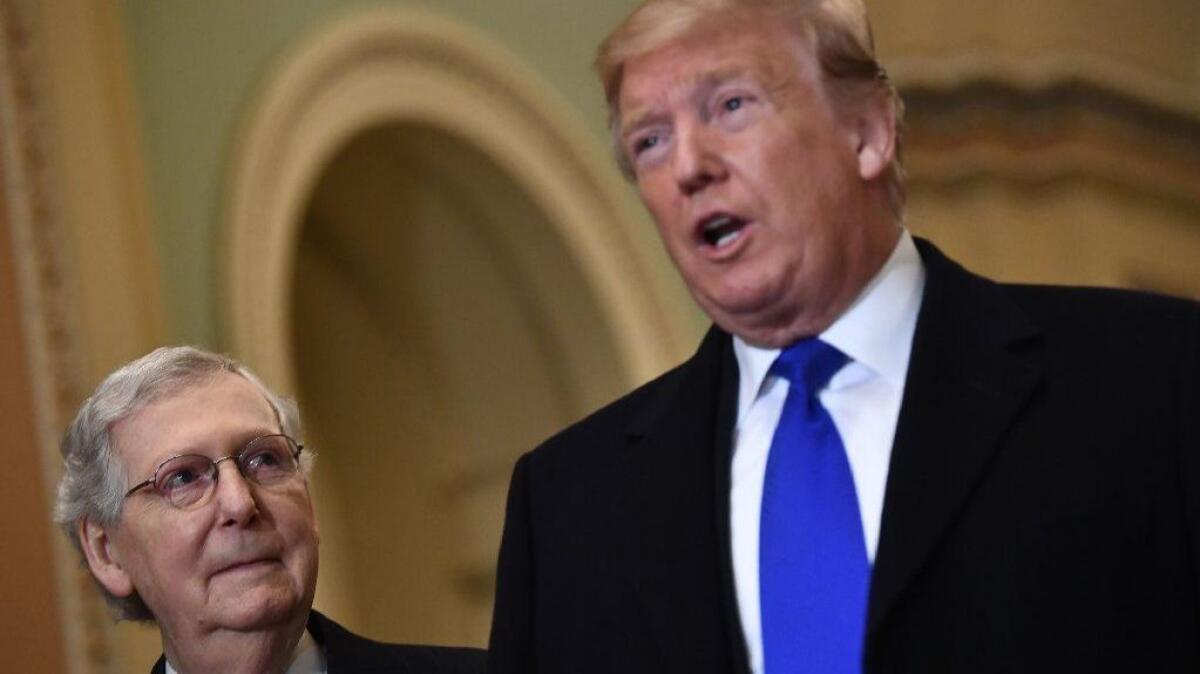Column: Obamacare didn’t implode, so now Trump is trying to blow it up

- Share via
Reporting from Washington — “I like chaos,” President Trump once said. He appeared to be joking — but he sometimes governs as if he meant it.
The latest case in point is Obamacare, the federal program that extended medical insurance to about 20 million previously uninsured people.
Last week, Trump blindsided his own allies in Congress by renewing his demand for complete repeal of the Affordable Care Act, as the 2010 healthcare law is more formally known, and promising that his party would soon offer “a plan that is far better.”
The president ordered the Justice Department to tell a federal court that his administration wants the law struck down as unconstitutional — every bit of it, including its protections for people with preexisting conditions and its guarantee that children can stay on their parents’ insurance until age 26.
He breezily told his allies in Congress to get ready to enact a replacement. “We are going to be, the Republicans, the party of great healthcare,” he said.
GOP leaders groaned. This wasn’t an assignment they wanted; they view it as a mission impossible. Their 2017 attempt to repeal Obamacare was a humiliating failure — and perhaps more than any other issue, it helped Democrats win control of the House of Representatives last year. Another round looks like a political loser.
So what was Trump thinking? As is often the case, his reasoning has been in plain view.
The president is still angry about that 2017 defeat; repealing Obamacare was one of the core promises of his presidential campaign. Seven months after the death of John McCain, Trump still complains about the Arizona senator’s crucial vote against the GOP bill.
More important, the president has often said forcing Obamacare to collapse may be the only way to compel Congress to act. It’s his version of chaos theory: If you create a crisis, you can make people agree to your terms.
“Let ObamaCare implode, then deal,” Trump tweeted in 2017. “Watch!”
But Obamacare didn’t implode. So now he’s trying to blow it up.
The gambit fits a pattern. Trump has threatened to walk out of NATO, the security treaty with Europe, if other countries don’t spend more on defense. He’s proposed closing the southern border if Mexico and other countries don’t do more to stop refugees. Last year he forced a partial government shutdown to get funding for a border wall.
It doesn’t always work. (The government shutdown didn’t.) And his approach seems especially unlikely to work in the case of healthcare.
First, health insurance is a very hard problem to solve. Trump learned that in 2017. But despite his hard-won education, he’s still over-promising what a Republican alternative can do. He’s still claiming he can deliver better care to more people at lower cost.
Nobody’s found a way to keep all three of those promises at once. Obamacare doesn’t cover everybody; and according to Trump, “the deductible is horrible.” Some of the GOP bills he endorsed in 2017 would have raised deductibles further and resulted in millions losing coverage.
Second, Republicans in Congress have never unified around a single approach:
Libertarians like Sens. Rand Paul of Kentucky and Mike Lee of Utah want to get the federal government out of health insurance.
Moderates like Sens. Susan Collins of Maine and Lamar Alexander of Tennessee have been willing to try to make Obamacare work.
Budget cutters like Sen. Ron Johnson of Wisconsin want to slash spending on Medicaid, the program for low-income people; GOP senators from states with big Medicaid rolls, like Rob Portman of Ohio, are opposed.
Third, Democrats control the House now. “We couldn’t repeal and replace it with a Republican House,” Alexander noted with a rueful laugh. It would be even harder now.
And Democrats appear unified in their zeal to defend Obamacare. Last week House Speaker Nancy Pelosi unveiled a proposal to reduce premiums, especially for middle-class workers who have felt priced out. One of the first to endorse it was Rep. Alexandria Ocasio-Cortez of New York, usually a champion of more radical measures.
“I’m happy to support any provision that strengthens the ACA,” she said.
Predictably, Democrats hailed Trump’s call for Obamacare’s demise as an election year windfall. “Make our day,” Senate Democratic leader Charles E. Schumer of New York crowed.
The healthcare law has slowly grown in popularity since its rocky start; by a notable margin, more people now say they approve of it than disapprove.
The president wants to brand the GOP as “the party of great healthcare,” but without a replacement in place it inevitably looks more like the party that just loathes Obamacare.
All that’s why Senate Republican Leader Mitch McConnell of Kentucky so quickly rejected the president’s invitation that he take charge of drafting a new plan.
“I look forward to seeing what the president is proposing and what he can work out with the speaker,” McConnell told Politico — evidence that his wit has been underappreciated.
Until then, the not very confidential strategy of most Senate Republicans is to work on modest, potentially bipartisan measures to reduce healthcare costs, so they have something positive to talk about in the 2020 campaign.
That, and pray that the Supreme Court doesn’t rule Obamacare unconstitutional — not, at least, in an election year.
More to Read
Get the L.A. Times Politics newsletter
Deeply reported insights into legislation, politics and policy from Sacramento, Washington and beyond. In your inbox twice per week.
You may occasionally receive promotional content from the Los Angeles Times.











